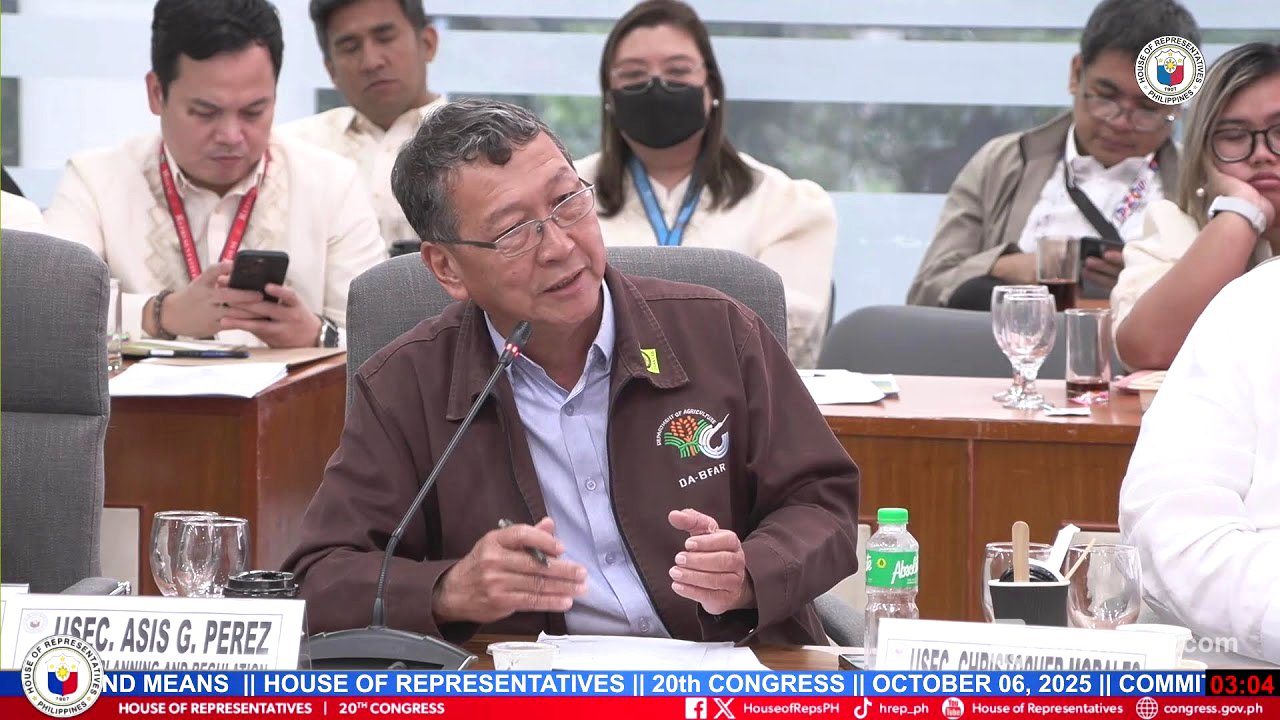TLDR;
This joint congressional briefing addresses Executive Order (EO) 93, which temporarily suspends rice importation to protect local farmers. Key points include the impact of the EO on import arrivals and domestic prices, challenges in NFA procurement and warehouse capacity, and potential policy options like extending the import suspension or adjusting tariff rates. The discussion also covers the roles of various government agencies, the concerns of farmers, and the need for accurate data and effective competition to ensure fair prices and food security.
- EO93 Impact: Aims to stabilize domestic rice prices and protect local farmers by suspending rice imports for 60 days.
- Challenges: Limited NFA capacity, weather-related impacts, and variability in farmgate prices.
- Policy Options: Extending import suspension, price support mechanisms, and logistical assistance.
- Key Issues: Tariff rates, NFA funding, predatory pricing, and the need for accurate data.
Prayer Before the Briefing [0:30]
Arbor Ernz Jonicio leads a prayer, expressing gratitude for the opportunity to gather and seeking wisdom and unity in addressing the challenges faced by farmers. The prayer asks for clarity of mind and compassion in making decisions to ease the burden of low rice prices and protect the livelihoods of farmers. It emphasizes the importance of fairness, sustainability, and economic justice in the discussions.
Call to Order and Acknowledgment of Attendees [1:58]
The joint meeting of the committees on agriculture and food and ways and means is called to order. The committee secretary acknowledges the presence of Speaker Faustino Bogi, members of both committees, and various resource persons from the Department of Agriculture, Department of Finance, Department of Trade and Industry, Philippine Competition Commission, and other organizations, including representatives from the international rice research institute and farmers.
Opening Remarks by Speaker Faustino Bodi D. Third [8:10]
Speaker Faustino Bodi D. Third expresses gratitude to the committees and resource persons for focusing on the challenges in the agriculture sector. He highlights Executive Order 93, which temporarily suspends rice importation to protect local farmers, as a clear demonstration of President Ferdinand Marcos Jr.'s concern for agriculture. He suggests importers should allocate funds equivalent to the value of their imports to buy local rice and that import quantities should be based on actual data from the Department of Agriculture's post-harvest assessment. He also mentions that the 2026 National Budget will include direct cash assistance for one million farmers and advocates for subsidies from the Department of Agriculture, such as seeds and cash, to directly benefit farmers. The speaker also promotes the Rice Industry and Consumer Empowerment Act or Rice Act to strengthen the National Food Authority or NFA, tariff reforms, and dynamic floor price for rice.
Outlining the Flow of Discussion [17:52]
The chair outlines the flow of the discussion, beginning with a status report from the Department of Agriculture on the implementation of Executive Order 93. Representatives from other concerned agencies may respond to questions within their respective jurisdictions. Following the presentation, the floor will be opened for statements or questions from the members.
Presentation by DA Secretary Francisco Kiko Chu Laurel and Usec. Christopher V. Morales [18:37]
Secretary Francisco Kiko Chu Laurel introduces Undersecretary Christopher V. Morales, who presents the current status of implementation of EO93. The EO mandates a 60-day suspension of rice imports, effective September 1, to stabilize domestic rice prices and protect local farmers. Before the EO, monthly rice import arrivals ranged from 305,000 to 517,800 metric tons. After the EO, only 347,000 metric tons arrived in September. From January to August, NFA procured 325,000 metric tons of rice and distributed 36,872 metric tons. In September, NFA procured 9,651 metric tons and distributed 6,5359 metric tons. As of October 1, NFA rice stock inventory stood at 446,157 metric tons, equivalent to 11.66 days of national requirements. The projected rice supply by the end of 2025 is around 3.24 to 4.06 million metric tons, equivalent to 85 to 106 days of national requirements. Farmgate prices range from 7.5 to 18.20 per kilo for fresh rice and 11.09 to 25 per kilo for dry rice. Prices of imported well-milled and regular meal rice were at 43.28 and 37.35 per kilogram, while local prices were 43.1 and 37.79. The implementation of EO93 faces challenges such as NFA capacity constraints and weather-related impacts. Policy options under consideration include extending the import suspension, providing price support mechanisms, and logistical assistance to NFA.
DA's Position and Future Plans [28:11]
Secretary Laurel comments on the data presented, noting that the Philippines imported 3.5 million tons of rice as of the end of September, exceeding the projected harvest. He explains that the existing law allows for liberalized importation, which poses a challenge. The President is considering extending the import suspension until the end of 2025 or increasing the tariff to 35%. The DA's plan is to allow importation in January for one month and then cut it again from mid-February until the end of April. The DA is also seeking an EO for a minimum floor price for rice and a 3 billion fund for warehouse logistics and to procure storm-damaged rice.
Remarks from NFA Administrator Larry Lacson [37:16]
Administrator Larry Lacson reports that NFA has purchased 62% of its target and will procure 4 million bags of rice until December. They are in deficit of more than 1.1 million bags of warehouse space and need at least 64 new warehouses for leasing. Current stocks are at 466,000 metric tons, which will be reduced through the auction of aging rice this month. The agency is buying fresh rice at Php17 per kilo and dry rice at Php23 per kilo. The remaining 4 million bags will help about 40,000 farmers nationwide. The agency is asking for a budget for warehousing, as its corporate receipt for the year is only 1.2 billion versus an actual cost of 6 billion.
Remarks from DOF Representative Carlo Fern Adriano [42:39]
Carlo Fern Adriano from the Department of Finance (DOF) estimates that the revenue foregone due to the import ban is around 1.4 to 2 billion every month in terms of duties. The review of tariff rates is still pending. The DOF will update the committee once they have the final results from the tariff commission and the economic managers.
Appeal to Revert to 35% Tariff [44:14]
Speaker Bodgie reiterates the importance of reverting to the 35% tariff. The committee chair supports the speaker's appeal, noting that it was an output of the committee in the previous congress.
Brief Report from PIDS Senior Fellow Roehl Briones [46:07]
Roehl Briones, a senior fellow at the Philippine Institute for Development Studies (PIDS), presents data on the decline in world rice prices leading up to the import suspension. He notes that the tariff rate was cut by 35% against the backdrop of very expensive world prices. World prices started to decline steeply, especially after India relaxed its export restrictions. Domestic farmgate prices also fell, with the average monthly rice price in Nueva Ecija dropping from almost Php28 to 16.3. Retail prices also declined, benefiting consumers. Stocks increased to an all-time high in July of this year. He suggests that the import suspension did not destabilize the market but halted the decline in rice prices.
Comments on PIDS Presentation and Data Accuracy [52:48]
Secretary Kiko Laurel comments on the PIDS presentation, expressing concern about the data set used. He argues that the price of imported rice should be based on Vietnamese rice, not Thai rice, as the Philippines predominantly buys from Vietnam. He also points out that the price listed for September was not the real market price. He emphasizes the need to agree on one data set to get the right information for decision-making.
Further Discussion on Data and Market Dynamics [55:32]
The discussion continues with comments on the reference prices and the impact of the Philippines' import demand on world market prices. Concerns are raised about the effect of lowering tariffs and the need to closely monitor the market dynamics.
Brief Report from PCC Representative Carlos Vega [1:01:15]
Carlos Vega from the Philippine Competition Commission (PCC) discusses the potential market outcomes of the import ban and its possible extension. He notes that the expected outcome is for farmgate prices to increase, but this depends on whether intermediate agents have an incentive to offer higher prices to rice farmers. He raises concerns about buyer power and the possibility of a double setback where both consumers and farmers do not benefit. He suggests verifying the extent of vertical integration among importers and determining whether the various companies involved in the import trade are independent of each other. He encourages caution in dealing with the import ban and extension, recommending waiting for relevant data to be available and making correct comparisons.
Farmer Representative Danilo Bolos Shares His Experience [1:07:03]
Danilo Bolos, a farmer representative from Nueva Ecija, shares his experience of struggling with low earnings and losses. He expresses gratitude for government aid but notes that it doesn't always translate into tangible benefits. He highlights the impassable roads in their farms and the lack of income to support their families' needs. He appeals for an end to their suffering and hopes for a fair price for their products.
Response from Speaker Bodi and Discussion on RA 11203 [1:13:00]
Speaker Bodi expresses respect for the farmers and assures them that the government will do everything to ensure their welfare. He mentions that they are currently fixing RA 11203 to help farmers and prioritize their needs.
Questions on the Impact of EO 93 and Predatory Pricing [1:15:44]
The discussion shifts to the impact of EO 93, with questions about whether it has helped farmers and concerns about predatory pricing during the rainy season. The DA secretary acknowledges the possibility of predatory pricing and the challenges farmers face due to weather-related issues.
PCC's Role and Investigation of Predatory Pricing [1:30:08]
The Philippine Competition Commission (PCC) explains its role in addressing predatory pricing and market imperfections. The PCC investigates cases of abuse of dominance by entities that control prices. The PCC is currently investigating entities that have names, but it cannot disclose the details of ongoing investigations.
Discussion on Import Ban Extension and Market Effects [1:37:03]
The discussion focuses on the potential effects of extending the import ban, with concerns about whether it will lead to increased prices for consumers without benefiting farmers. The PCC suggests that the lack of incentive for intermediate agents to increase prices is a key factor.
Addressing Farmers' Concerns and Government Support [1:45:12]
The discussion addresses the challenges faced by farmers, including small incomes and price manipulation. The government is exploring ways to support farmers, such as providing drying systems and rice processing systems. The importance of clustering farmers and providing them with resources to sell rice directly is emphasized.
Analyzing Retail and Farmgate Prices [1:52:19]
The discussion analyzes the relationship between retail and farmgate prices, with questions about whether addressing market imperfections can lead to lower retail prices for consumers and higher incomes for farmers. The PCC agrees that resolving market imperfections can lead to convergence between rice prices and retail prices.
President's Priorities and Legislative Agenda [1:53:59]
The discussion shifts to the President's priorities, including the Rice Act and support for clustering co-ops. The importance of addressing the low incomes of farmers is emphasized.
Concerns of Farmers and the Need for Immediate Solutions [1:56:52]
Farmers express concerns about their situation, including debt and uncertain income. The need for urgent action and support is emphasized.
NFA's Absorptive Capacity and Warehouse Leasing [1:58:11]
The discussion focuses on the NFA's absorptive capacity and the need for additional warehouses. The NFA is exploring options for leasing private warehouses and collaborating with local government units.
Floor Price for Rice and Farmers' Proposals [2:10:57]
The discussion turns to the floor price for rice, with proposals to set it at Php20 per kilo or higher. The importance of ensuring a substantial profit margin for farmers is emphasized.
DA's Position on Floor Price and Farmer Assistance [2:17:33]
The DA clarifies its position on the floor price, stating that the President's wish is at least Php18 to Php19 for wet rice. The DA also explains how the Php7,000 assistance for farmers was determined, based on available funding and the number of eligible farmers.
Bureau of Customs and Reduced Tariffs [2:21:55]
The Bureau of Customs explains how it manages the reduced tariffs and the impact on revenue collection. Despite the reduced tariffs, the BOC has surpassed its target for September.
PCC's Investigation and Market Dominance [2:27:53]
The PCC discusses its role in investigating market dominance and ensuring fair competition. The PCC is looking into potential abuses of power by dominant entities in the rice market.
Proposed Amendments to RA 11203 and Fertilizer Subsidies [2:35:19]
The discussion shifts to proposed amendments to RA 11203 and concerns about fertilizer subsidies. The DA explains its efforts to provide fertilizer support to farmers and its plans to move towards an IMC card system.
DA's Stance on Liberalization and Long-Term Solutions [2:41:15]
The DA reiterates its disagreement with liberalization and its commitment to protecting farmers. The importance of long-term solutions, such as investing in irrigation and logistics, is emphasized.
Challenges and Solutions for Rice Farmers [2:42:28]
The discussion highlights the challenges faced by rice farmers, including small incomes and price manipulation. The need for government intervention and support is emphasized.
Rice Self-Sufficiency and Irrigation [2:44:52]
The discussion focuses on the goal of rice self-sufficiency and the need for investments in irrigation. The DA estimates that achieving rice self-sufficiency would require irrigating 1 million hectares of land and investing Php1 trillion.
Mindset Shift and Market Imperfections [2:47:24]
The discussion highlights the need for a mindset shift towards industrial or corporate farming and addressing market imperfections. The importance of ensuring that farmers earn a profit and contribute to the economy is emphasized.
EO 93 and Import Rules [2:51:54]
The discussion addresses the triggers for extending the import ban and the need for clear and transparent import rules. The DA explains that the existing law limits its control over importation, but the proposed Rice Act would provide a roadmap for managing stocks and importation.
Long-Term Solutions and Data-Driven Policies [2:53:51]
The importance of long-term solutions, such as investing in storage and mechanization, is emphasized. The need for data-driven policies and a comprehensive approach to addressing the challenges faced by rice farmers is highlighted.
NFA Capacity and Warehouse Locations [2:57:33]
The discussion focuses on NFA capacity and the locations where additional warehouses are needed. The NFA provides a list of provinces where warehouses are needed.
Agri Competitiveness Enhancement Fund [2:59:23]
The discussion explores the Agri Competitiveness Enhancement Fund and its potential use for renting warehouses. The remaining balance of the fund is around 2.2 billion.
Crop Insurance and Loan Programs [3:03:21]
The discussion shifts to crop insurance and loan programs for farmers. The need for additional funding for crop insurance and streamlined loan requirements is emphasized.
Long-Term Support and Training Programs [3:06:51]
The importance of long-term support and training programs for future generations of rice farmers is highlighted. The need for extension workers and a focus on community-specific needs is emphasized.
Agri Competitive Enhancement Fund and Earmarked Funds [3:08:39]
The discussion clarifies that the Agri Competitive Enhancement Fund is earmarked and cannot be easily moved to other agencies.
Executive Order 93 and Farmer Support [3:12:19]
The discussion emphasizes the importance of supporting farmers and addressing their needs. The need for a floor price for rice and assistance with loans and fertilizers is highlighted.
Republic Act 11203 and Dumping Duty [3:15:55]
The discussion focuses on Republic Act 11203 and the possibility of imposing a dumping duty on imported rice. The process for filing a complaint and initiating a dumping duty investigation is explained.
Bureau of Customs and Collection Targets [3:20:19]
The Bureau of Customs reports that it has surpassed its target for September, despite the reduced volume of imports. The bureau expects to meet its targets for the remaining months of the year.
PCC and Information Sharing [3:21:13]
The PCC confirms that it cooperates with the BOC for requests for import data. The importance of information sharing between the PCC and BOC for proper profiling of rice traders and importers is emphasized.
Irrigation Budget and NIA's Performance [3:22:56]
The discussion addresses the budget for irrigation and the performance of the National Irrigation Administration (NIA). Concerns are raised about the disconnect between the DA and NIA and the need for a more holistic approach to irrigation.
Top Importers and Market Dominance [3:27:54]
The discussion identifies the top importers of rice and raises concerns about market dominance. The PCC is encouraged to take a look at the situation.
Manifestation on Rice Policy and Government Efforts [3:46:08]
A manifestation is made, highlighting the government's efforts to bring down the price of rice and support farmers. The importance of balancing the needs of farmers and consumers is emphasized.
Congratulations and Concerns for Mindanao [3:52:13]
The speaker congratulates the chairman for leading the charge for the amendment of Republic Act 8178. Concerns are raised about the lack of representation from Mindanao in the joint meeting. A commitment is made to include representatives from Mindanao in future hearings.









